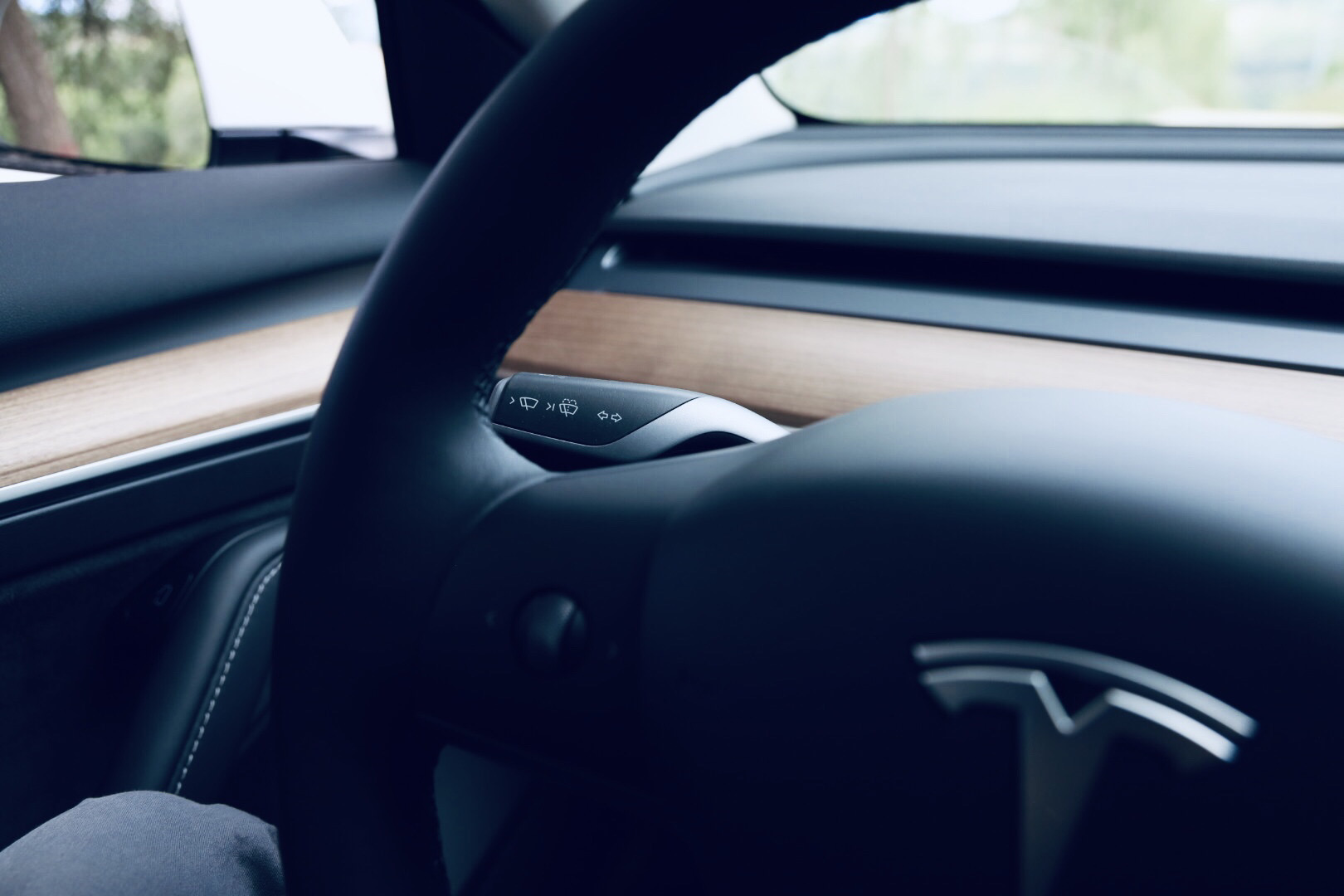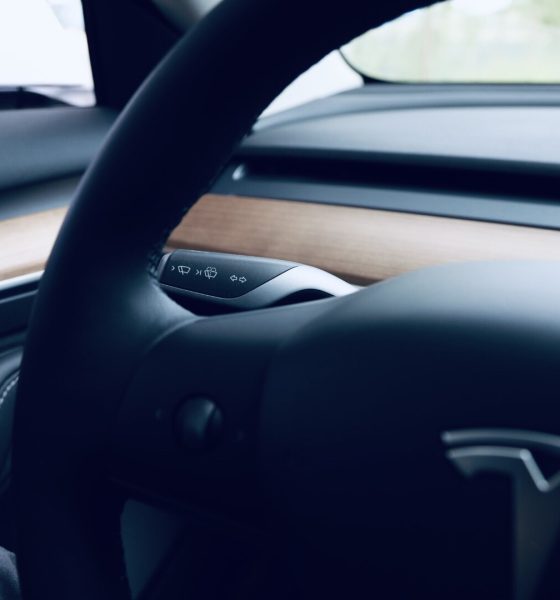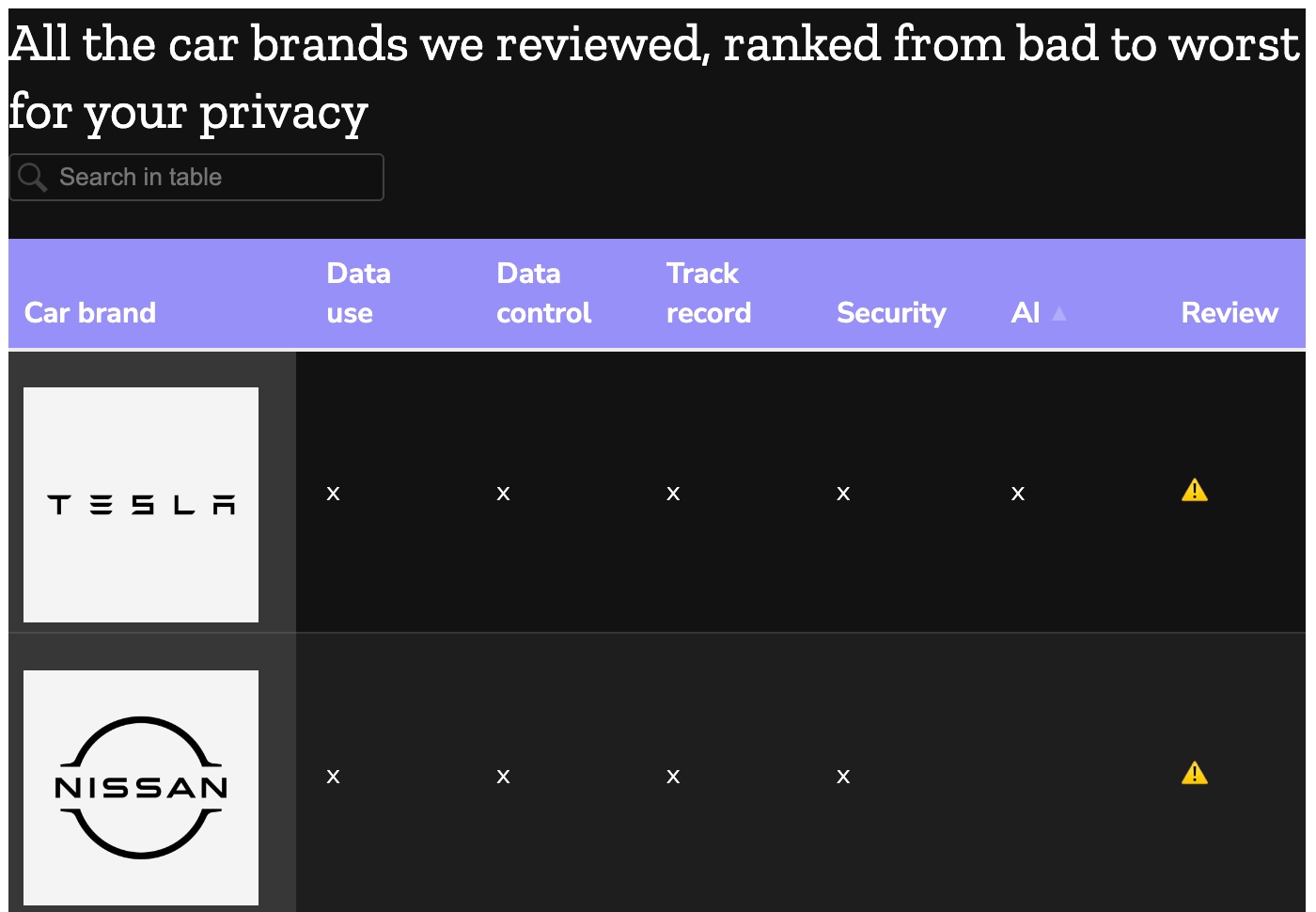

News
Mozilla Foundation dubs Tesla, Nissan, and fellow modern cars a “privacy nightmare”
A report published by the Mozilla Foundation has claimed that cars are the “worst category of products for privacy” that the firm has ever reviewed. As noted by Mozilla, out of 25 car brands that it studied, none made the cut. Tesla, arguably the most software-focused carmaker today, was singled out by the firm for its “untrustworthy AI.”
Mozilla noted that automakers today, if one were to closely look at their privacy policies, collect a lot of data. The firm noted that every single one of the 25 car brands that it studied collected more personal data than necessary. Around 84% of the carmakers also share or sell customer data, and 92% give drivers little to no control over their personal data.
Specifically, Mozilla studied Renault, Dacia, BMW, Subaru, Fiat, Jeep, Chrysler, Dodge, Volkswagen, Toyota, Lexus, Ford, Lincoln, Audi, Mercedes-Benz, Honda, Acura, Kia, Chevrolet, Buick, GMC, Cadillac, Hyundai, Nissan, and Tesla. Among these, Mozilla called out Tesla and Nissan for data privacy policies that are reportedly alarming.
As noted by Mozilla, Tesla is actually not too bad when it comes to its privacy policies. The company, for one, does not sell or rent personal information to third parties. Tesla also gives owners the choice of whether they wish to share their personal information with third parties or not. Mozilla, however, took issue with Tesla’s warning that customers who opt out of vehicle connectivity could have a car that’s unusable.
“If you no longer wish for us to collect vehicle data or any other data from your Tesla vehicle, please contact us to deactivate connectivity. Please note, certain advanced features such as over-the-air updates, remote services, and interactivity with mobile applications, and in-car features such as location search, Internet radio, voice commands, and web browser functionality rely on such connectivity.
“If you choose to opt out of vehicle data collection (with the exception of in-car Data Sharing preferences), we will not be able to know or notify you of issues applicable to your vehicle in real time. This may result in your vehicle suffering from reduced functionality, serious damage, or inoperability,” Tesla’s privacy notice read.
Nissan, for its part, is reportedly worse, Mozilla noted. The firm noted that in the Nissan USA privacy notice, the automaker makes references to some strange policies. In the “Types of Personal Data collected” section of the page, for one, Nissan noted that things such as “citizenship status, immigration status, race, national origin, religious or philosophical beliefs, sexual orientation, sexual activity, and genetic information” are collected.

Nissan also noted that the company could share and sell “inferences drawn from any Personal Data collected to create a profile about a consumer reflecting the consumer’s preferences, characteristics, psychological trends, predispositions, behavior, attitudes, intelligence, abilities, and aptitudes” to other parties for targeted marketing purposes.
“Nissan earned its second-to-last spot for collecting some of the creepiest categories of data we have ever seen. It’s worth reading the review in full, but you should know it includes your ‘sexual activity.’ Not to be outdone, Kia also mentions they can collect information about your ‘sex life’ in their privacy policy. Oh, and six car companies say they can collect your ‘genetic information’ or ‘genetic characteristics.’ Yes, reading car privacy policies is a scary endeavor,” the Mozilla Foundation noted.
The Mozilla Foundation noted that Nissan is probably the worst car company that it has reviewed with regards to privacy. However, in the firm’s rankings, it opted to put Tesla at the bottom of the list, below Nissan. This, according to Mozilla, was because Tesla also received marks for having “untrustworthy AI,” which is connected to Autopilot.
“Tesla is only the second product we have ever reviewed to receive all of our privacy ‘dings.’ (The first was an AI chatbot we reviewed earlier this year.) What set them apart was earning the ‘untrustworthy AI’ ding. The brand’s AI-powered Autopilot was reportedly involved in 17 deaths and 736 crashes and is currently the subject of multiple government investigations,” the foundation noted.
Don’t hesitate to contact us with news tips. Just send a message to simon@teslarati.com to give us a heads-up.

News
Tesla ships out update that brings massive change to two big features
“This change only updates the name of certain features and text in your vehicle,” the company wrote in Release Notes for the update, “and does not change the way your features behave.”

Tesla has shipped out an update for its vehicles that was caused specifically by a California lawsuit that threatened the company’s ability to sell cars because of how it named its driver assistance suite.
Tesla shipped out Software Update 2026.2.9 starting last week; we received it already, and it only brings a few minor changes, mostly related to how things are referenced.
“This change only updates the name of certain features and text in your vehicle,” the company wrote in Release Notes for the update, “and does not change the way your features behave.”
The following changes came to Tesla vehicles in the update:
- Navigate on Autopilot has now been renamed to Navigate on Autosteer
- FSD Computer has been renamed to AI Computer
Tesla faced a 30-day sales suspension in California after the state’s Department of Motor Vehicles stated the company had to come into compliance regarding the marketing of its automated driving features.
The agency confirmed on February 18 that it had taken a “corrective action” to resolve the issue. That corrective action was renaming certain parts of its ADAS.
Tesla discontinued its standalone Autopilot offering in January and ramped up the marketing of Full Self-Driving Supervised. Tesla had said on X that the issue with naming “was a ‘consumer protection’ order about the use of the term ‘Autopilot’ in a case where not one single customer came forward to say there’s a problem.”
This was a “consumer protection” order about the use of the term “Autopilot” in a case where not one single customer came forward to say there’s a problem.
Sales in California will continue uninterrupted.
— Tesla North America (@tesla_na) December 17, 2025
It is now compliant with the wishes of the California DMV, and we’re all dealing with it now.
This was the first primary dispute over the terminology of Full Self-Driving, but it has undergone some scrutiny at the federal level, as some government officials have claimed the suite has “deceptive” names. Previous Transportation Secretary Pete Buttigieg was one of those federal-level employees who had an issue with the names “Autopilot” and “Full Self-Driving.”
Tesla sued the California DMV over the ruling last week.
News
Tesla workers push back against Giga Berlin unionization
“IG Metall did not succeed in Giga Berlin‘s works council election earlier today. The union share was reduced from nearly 40% in 2024 to 31% in 2026! This is a clear message by the Giga Berlin team towards an independent co-determination! The list called Giga United, led by the current chairwoman, Michaela Schmitz, received the most votes with more than 40%! Good news for Giga Berlin!”

Tesla workers pushed back against unionization efforts at Gigafactory Berlin, and over the past few years, there has been a dramatic decrease in interest to unionize at the German plant.
Gigafactory Berlin Plant Manager André Thierig announced on Wednesday that IG Metall, the European union group, saw its share reduce from 40 to 31 percent in 2026 as employees eligible to vote on the issue. Instead, the Giga Berlin team, known as Giga United, received the most votes with more than 40 percent.
BREAKING! 🚨
IG Metall did not succeed in Giga Berlin‘s works council election earlier today. The union share was reduced from nearly 40% in 2024 to 31% in 2026!
This is a clear message by theGiga Berlin team towards an independent co-determination!
The list called Giga…
— André Thierig (@AndrThie) March 4, 2026
Thierig gave specific details in a post on X:
“IG Metall did not succeed in Giga Berlin‘s works council election earlier today. The union share was reduced from nearly 40% in 2024 to 31% in 2026! This is a clear message by the Giga Berlin team towards an independent co-determination! The list called Giga United, led by the current chairwoman, Michaela Schmitz, received the most votes with more than 40%! Good news for Giga Berlin!”
There were over 10,700 total employees who were eligible to vote, with 87 percent of them turning out to cast what they wanted. There were three key outcomes: Giga United, IG Metall, and other notable groups, with the most popular being the Polish Initiative.
The 37-seat council remains dominated by non-unionized representatives, preserving Giga Berlin as Germany’s only major auto plant without a collective bargaining agreement.
Thierig and Tesla framed the outcome as employee support for an “independent, flexible, and unbureaucratic” future, enabling acceleration on projects like potential expansions or new models. IG Metall expressed disappointment, accusing management of intimidation tactics and an “unfair” campaign.
The first election of this nature happened back in 2022. In 2024, IG Metall emerged as the largest single faction with 39.4 percent, but non-union lists coalesced for a majority.
But this year was different. There was some extra tension at Giga Berlin this year, as just two weeks ago, an IG Metall rep was accused by Tesla of secretly recording a council meeting. The group countersued for defamation.
Tesla Giga Berlin plant manager faces defamation probe after IG Metall union complaint
This result from the 2026 vote reinforced Tesla’s model of direct employee-management alignment over traditional German union structures, amid ongoing debates about working conditions. IG Metall views it as a setback but continues advocacy. Tesla sees it as validation of its approach in a competitive EV market.
This outcome may influence future labor dynamics at Giga Berlin, including any revival of expansion plans or product lines, which Musk has talked about recently.
News
SpaceX President Gwynne Shotwell details xAI power pledge at White House event
The commitment was announced during an event with United States President Donald Trump.

SpaceX President Gwynne Shotwell stated that xAI will develop 1.2 gigawatts of power at its Memphis-area AI supercomputer site as part of the White House’s new “Ratepayer Protection Pledge.”
The commitment was announced during an event with United States President Donald Trump.
During the White House event, Shotwell stated that xAI’s AI data center near Memphis would include a major energy installation designed to support the facility’s power needs.
“As you know, xAI builds huge supercomputers and data centers and we build them fast. Currently, we’re building one on the Tennessee-Mississippi state line. As part of today’s commitment, we will take extensive additional steps to continue to reduce the costs of electricity for our neighbors…
“xAI will therefore commit to develop 1.2 GW of power as our supercomputer’s primary power source. That will be for every additional data center as well. We will expand what is already the largest global Megapack power installation in the world,” Shotwell said.
She added that the system would provide significant backup power capacity.
“The installation will provide enough backup power to power the city of Memphis, and more than sufficient energy to power the town of Southaven, Mississippi where the data center resides. We will build new substations and invest in electrical infrastructure to provide stability to the area’s grid.”
Shotwell also noted that xAI will be supporting the area’s water supply as well.
“We haven’t talked about it yet, but this is actually quite important. We will build state-of-the-art water recycling plants that will protect approximately 4.7 billion gallons of water from the Memphis aquifer each year. And we will employ thousands of American workers from around the city of Memphis on both sides of the TN-MS border,” she noted.
The Ratepayer Protection Pledge was introduced as part of the federal government’s effort to address concerns about rising electricity costs tied to large AI data centers, as noted in an Insider report. Under the agreement, companies developing major AI infrastructure projects committed to covering their own power generation needs and avoiding additional costs for local ratepayers.








